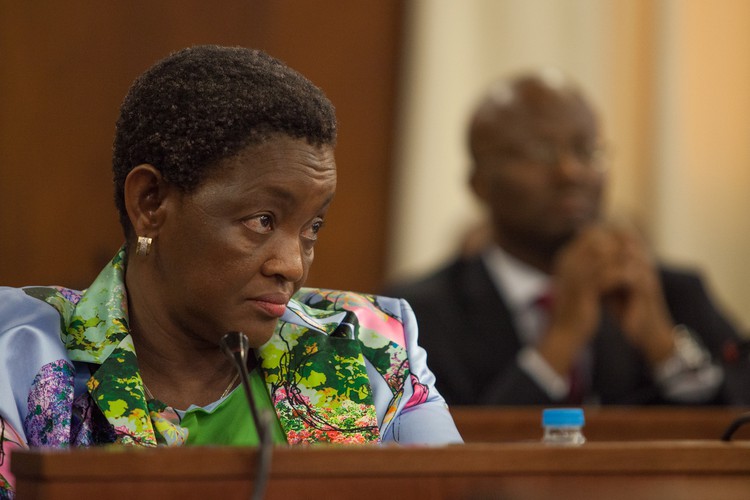Foster grants – Bathabile Dlamini’s next national embarrassment?
Six years after ruling, huge backlogs persist as December court deadline looms

The Department of Social Development may find itself in the same situation with foster care grants as it was earlier this year with the social grant pay-out crisis. The department missed the Constitutional Court’s deadline to take over the payment of social grants. This time the concern is over what some opposition parties label a looming crisis of foster care grants.
Thousands of foster care placement orders will expire by 31 December which means the accompanying foster care grant may not be paid out. DA MP Karen Jooste explains social workers can, through the court, get placement orders to place neglected or abused children with foster care parents who will then receive the grant of R920 per month. This is a temporary arrangement and the placement order must be reviewed every two years.
An increasing number of people have been seeking the foster care grant, causing a huge administrative burden and backlogs. This is because unlike the child support grant (R380 per month) the foster care grant process is long, complex and labour intensive, says Jooste.
“Social workers must investigate each case, do home visits, write reports and do presentations in court resulting in a turnover time for foster care placements of up to 18 months in the cities. After the court approves the placement, social workers must monitor, write reports on the child’s progress and justify any extension beyond two years,” says Jooste.
She says the foster care grant system “is about to collapse” because of the huge backlog and too little resources to review current placement orders or deal with new ones at the same time.
“Statistics show at the end of 2014, 300,000 placements had expired, representing over 60% of all foster care grants, and the grants were only paid out because of an order from the High Court. This order expires on 31 December 2017,” she warns.
In a parliamentary question, Jooste asked the Minister of Social Development Bathabile Dlamini how many of these foster care orders will expire by 31 December. She also asked what is the total value of the foster care grants for placements that will no longer be paid because of the care orders lapsing. She also wanted to know if the department has taken any steps to prevent the “crisis”.
Dlamini said her department cannot pre-empt “the actual number of orders that will lapse as the provinces are continually undertaking activities to ensure that foster care orders are extended”.
This week in her reply, Dlamini said there is a projected number of 54,835 foster care orders that are up for review between September and December, making it unlikely that all these orders will be extended in time.
She however dismissed the concern over grants that may go unpaid. “It is anticipated that no grants will be unpaid because of the foster care court orders expiring, given the implementation of the North Gauteng High Court ruling which allows Sassa (South African Social Services Agency) to continue paying the foster child grants, even with expired orders, while the Department of Social Development works on updating the orders.”
But rewind to 2011. The Department of Social Development found itself in court when the Child Law Centre challenged the minister over the high amount of foster care grants lapsing due to backlogs. The North Gauteng High Court in its ruling acknowledged the need for “comprehensive legal reform”. The court then set a moratorium on grants lapsing until December 2014 and this deadline was later extended to December 2017.
This meant as a stop gap measure foster care grants with expired court orders could continue to be paid. This gave Sassa and the department time to eradicate the backlog and make legal arrangements for a sustainable solution.
Yet now, six years later there is still a backlog and still no finalised “comprehensive legal reform” as the court requested. What there is, however, is growing uncertainty over what this may mean for the pay-out of the foster care grants.
In her answer on steps taken by her department to prevent a crisis, Dlamini referred to work done by the provincial departments of social development. This includes putting in place “administrative mechanisms to manage the extension of foster care orders and “allocation of social workers to conduct investigations, compile reports with recommendations for extension of foster care orders”. The measures Dlamini referred to are mainly aimed at addressing the backlogs and managing and processing extensions before 1 November 2017.
Nowhere does Dlamini mention anything about progress on the “comprehensive legal reform”. Six years later there is still no concrete policy position on Foster Care Grants – something that may just cause Dlamini and her department their next national embarrassment in December.
The Child Law Centre who in 2011 challenged the department in court said they will only make a statement next week on this matter.
Support independent journalism
Donate using Payfast

Don't miss out on the latest news
We respect your privacy, and promise we won't spam you.
© 2017 GroundUp. 
This article is licensed under a Creative Commons Attribution-NoDerivatives 4.0 International License.
You may republish this article, so long as you credit the authors and GroundUp, and do not change the text. Please include a link back to the original article.
